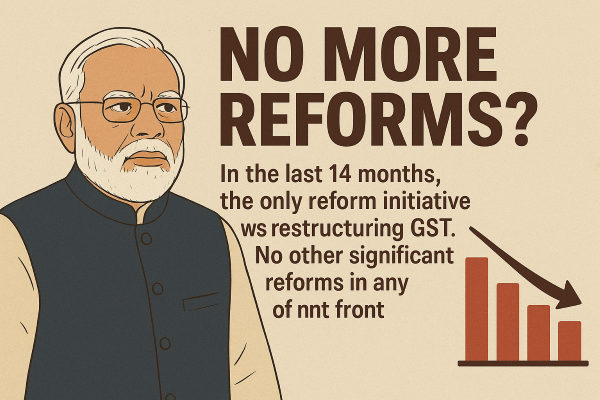INDIAN ECONOMY NOW IN CONSOLIDATION PHASE AND RIGHTLY SO – By N.S.Venkataraman


As Prime Minister Modi has completed two terms of five years each and now has crossed the eleventh year in the third term , section of people have expressed view that Modi government is no more keen about initiating reform in various fronts and is slowing down. In support of this view, it has been said that in the last fourteen months, the only reform initiative taken was with regard to restructuring Goods and Services Tax (GST) and there is no more reform measure in any other front worth pointing out.
Obviously, such criticism has emerged, as the critics have failed to have a holistic view of the entire spectrum of developments and activities that have been going on for the last eleven years in India , after Mr. Modi has taken over as Prime Minister.
It is true that during his first term and second term , several far reaching and significant reform measures were introduced in India in multiple fields in different directions. Such diversified areas where reform measures have been taken not only revolve around fields such as industrial and infrastructure sector but also in other fields , with social implications, that touched the life of poor people belonging to the lowest strata of the national economy. Steps were taken even to change habitual life style of people by launching yoga programme, clean India campaign and so on. Steps taken to construct millions of houses for poor people, construction of toilets etc. are very significant measures that are improving the quality of life of poor people.
With regard to the environmental issues, Modi government has promised during Paris Climate Conference that India would achieve zero emission by the year 2070. Towards this goal, several meaningful steps have been taken such as blending of ethanol with petrol, promotion of electric vehicles, boost for renewable energy and so on. With regard to renewable energy, Modi government has fixed ambitious target of 500 Gigawatt by 2030 and is well progressing to achieve this target.
Further, opening of zero bank account for poor people, digitalization programmes , introduction of Aadhar and direct transfer of welfare funds to the bank account of poor people are some of the hallmarks of the reform measures that are transforming the life style of common man in a positive way.
Positive impact of reform measures are already evident in several spheres and are further forging ahead. For example, India’s defence production has reached an all time high of Rs.1.51 lakh crore in F Y 2025. While public sector units continue to dominate defence production, the private sector contribution has been steadily increasing from 21% in F Y 2024 to 23% in F Y 2025.
To cut the long story short, Modi government’s efforts have resulted in India already becoming the fourth largest economy in the world and India’s GDP growth trend are now being applauded by multiple international credit rating agencies.
Various reform measures that were introduced in the first two terms of Prime Minister Mr. Modi are still work in progress stage. This is inevitable, as most of the reform measures have been introduced with long term targets and huge level of significance for the progress of the country in future. Obviously, they need to be implemented carefully and consistently with close monitoring before rushing with more reform measures.
Reform measures are not end by themselves. Introduction of reform measures by themselves would not be of any use , unless they are implemented over a period of time with competence and time bound schedule. Rushing with reform measures, that would not be adequately implemented , would only amount to loss of time and resources.
The so called “lull” in reform measures during the third term of Mr. Modi really reflects the healthy view of the Modi government that implementing the measures in a progressive and time bound manner before taking any further reform measures , which may still be needed , is necessary
While several reform measures have been introduced in the past, while implementing them , certain fine tuning would always become necessary in the light of the experience and any hurdle faced. Instead of criticizing Modi government for not implementing more reform measures, the critics would sound more credible if they would review the progress and performance on the ground with regard to the reform measures already introduced now.




















